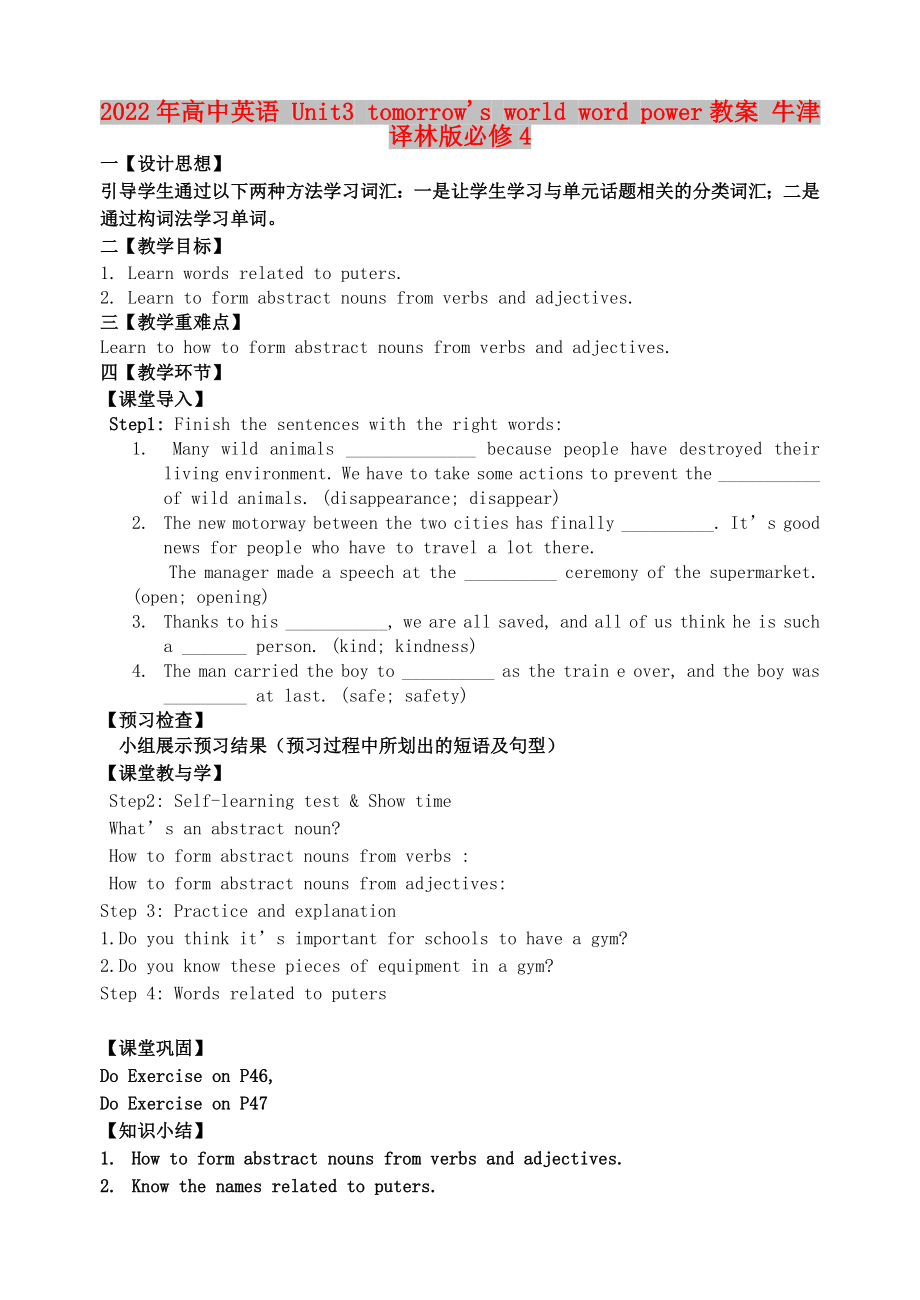《2022年高中英語 Unit3 tomorrow's world word power教案 牛津譯林版必修4》由會(huì)員分享,可在線閱讀����,更多相關(guān)《2022年高中英語 Unit3 tomorrow's world word power教案 牛津譯林版必修4(2頁珍藏版)》請(qǐng)?jiān)谘b配圖網(wǎng)上搜索�����。
1����、2022年高中英語 Unit3 tomorrow's world word power教案 牛津譯林版必修4
一【設(shè)計(jì)思想】
引導(dǎo)學(xué)生通過以下兩種方法學(xué)習(xí)詞匯:一是讓學(xué)生學(xué)習(xí)與單元話題相關(guān)的分類詞匯����;二是通過構(gòu)詞法學(xué)習(xí)單詞。
二【教學(xué)目標(biāo)】
1. Learn words related to puters.
2. Learn to form abstract nouns from verbs and adjectives.
三【教學(xué)重難點(diǎn)】
Learn to how to form abstract nouns from verbs and adjectives.
四【教學(xué)環(huán)節(jié)
2�����、】
【課堂導(dǎo)入】
Step1: Finish the sentences with the right words:
1. Many wild animals ______________ because people have destroyed their living environment. We have to take some actions to prevent the ___________ of wild animals. (disappearance; disappear)
2. The new motorway between the two cities
3�����、has finally __________. It’s good news for people who have to travel a lot there.
The manager made a speech at the __________ ceremony of the supermarket. (open; opening)
3. Thanks to his ___________, we are all saved, and all of us think he is such a _______ person. (kind; kindness)
4. The man
4���、carried the boy to __________ as the train e over, and the boy was _________ at last. (safe; safety)
【預(yù)習(xí)檢查】
小組展示預(yù)習(xí)結(jié)果(預(yù)習(xí)過程中所劃出的短語及句型)
【課堂教與學(xué)】
Step2: Self-learning test & Show time
What’s an abstract noun?
How to form abstract nouns from verbs :
How to form abstract nouns from adjectives:
St
5�����、ep 3: Practice and explanation
1.Do you think it’s important for schools to have a gym?
2.Do you know these pieces of equipment in a gym?
Step 4: Words related to puters
【課堂鞏固】
Do Exercise on P46,
Do Exercise on P47
【知識(shí)小結(jié)】
1. How to form abstract nouns from verbs and adjectives.
2. Know the names related to puters.
【提升與拓展】
1. play an important role
2. set up
3. make a profit
4. end in failure
【課后預(yù)習(xí)】
預(yù)習(xí)課本P48-51的內(nèi)容�,了解被動(dòng)語態(tài)的基本概念和關(guān)系代詞的用法�。
五【板書設(shè)計(jì)】
六【家庭作業(yè)】
1. 復(fù)習(xí)本節(jié)課所學(xué)內(nèi)容。
2. 教師根據(jù)教輔資料自行安排家庭作業(yè)
 2022年高中英語 Unit3 tomorrow's world word power教案 牛津譯林版必修4
2022年高中英語 Unit3 tomorrow's world word power教案 牛津譯林版必修4

